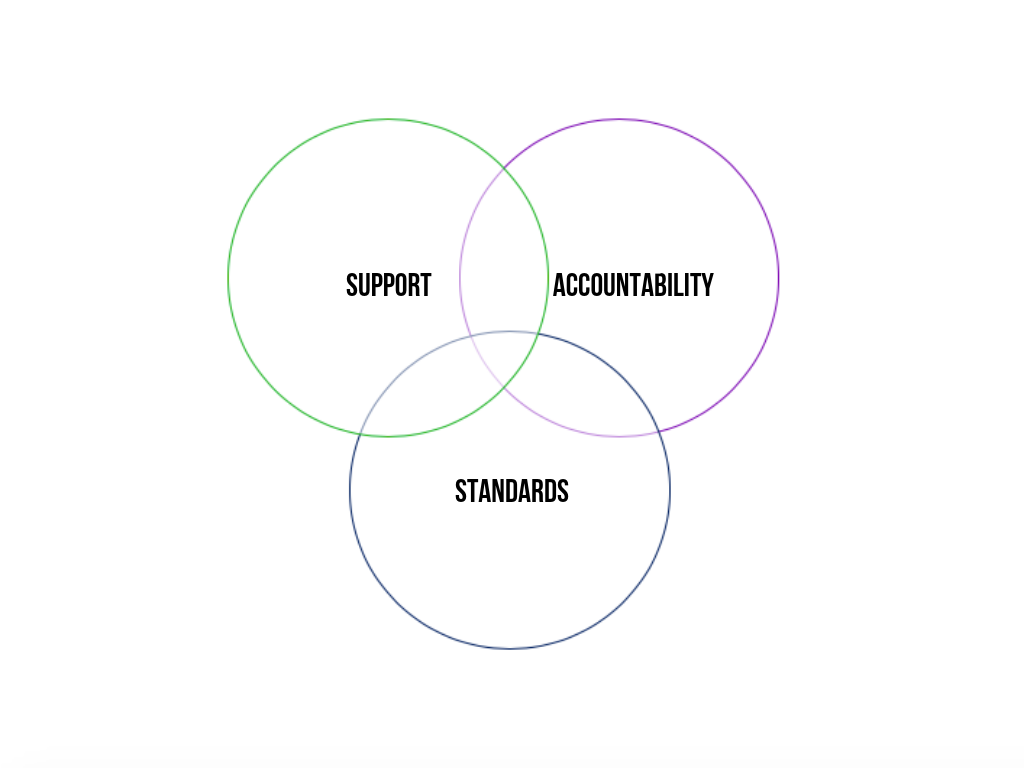[:en]If you want traction for change among individuals in your organization, it is only when there are clear standards of performance or behavior, accountability to meet them, and support to help people succeed that a change can take hold. In my experience, a deficit in any one of these three will alter the way any change is treated and viewed, and will lose traction as a result.

How a change will be treated and viewed depends on which of among support, accountability, and standards is in deficit.
- When accountability is lacking, despite clear standards of behavior and performance and ample support to succeed, change becomes no more than an extracurricular activity.
- When a standard of performance and behavior is unclear or inconsistent, despite processes for holding people accountable and ample investment in support, change becomes an exercise in lip service.
- When you have clear accountability and standards but insufficient support, change becomes a meat grinder.
How do these happen? Read on and I explain.
1. Change as an extracurricular activity. The value of support to change or improve is diminished when accountability is lacking, regardless of ample support and a clear standard of performance and behavior.
More than one global company I know makes English the internal language of business—even in the Japan office—yet only a handful I know have achieved success. In most companies, the standard for English capability is clear and the best among them provide multiple options for support both formal and informal to help people succeed, whether classes, private instruction, or stints abroad. One company I know even provides any employee nine months paid leave to go to the United States to study English.
Yet, despite ample and generous support to help people achieve a standard of performance or capability, in companies where accountability for meeting the standard is lacking, staff view improving English capability as an extracurricular activity separate from the rigors of their day job. In such companies, employees can often still progress in their careers without English ability. In my experience, only a minority ever take advantage of the support and even fewer achieve the standard.
In more than one company I know, it was only after implementation of a requirement for English ability for anyone in a director-level position that more junior employees began to take developing English capability seriously. HR also began to treat English as a requirement—not just a “nice-to-have” ability in candidates.
If you find that any change you are trying to achieve in your organization is being treated like an extracurricular or voluntary activity, have a look at accountability. Click To TweetIt is likely that insufficient accountability is causing the lack of traction.
2. Change as a lip service. When standards of behavior and performance are left wanting, systems and processes for holding people accountable lose meaning and investment in support achieves little return. Change is viewed merely as a passing fad. Just going through the motions with a good attitude is enough to get through.
At a Japanese company I know, despite elaborate systems for holding people accountable and ample investment in support for change, standards are fluid. Each change the leadership attempts to make is greeted with at least feigned enthusiasm and pro-forma participation in support activities like strategy development workshops and sales training sessions—only to return to establish patterns of behavior and performance and the results these entail.
Staff are ostensibly held to account in formal reviews. However, these matter little as there are no clear or consistent standards—not for performance for sales staff or staff in other functions, nor for performance in a leadership position. It is attitude, displays of effort, likability, and seniority that count most. The company’s leaders are reluctant to impose standards to avoid disrupting a culture of collegiality.
Poor managers are indulged for years because they are nice people and loyal employees—that is until the results of their underperformance become too much for the business’s leaders to abide. By then, the damage has been done. Underperforming sales staff are tolerated for years because they have great attitudes and make a good effort.
Some staff who are seriously good at their jobs get overlooked for promotion, for it is not behaviors and results that count the most, but rather collegiality. Their excellence makes others suspicious, and they become less than “likable.” Such employees often leave to join a competitor where excellence counts.
While the company is profitable, it chronically underperforms. Similar companies in their industry that were established during the same post-war period have far outstripped its growth. The more successful companies impose standards—at least with greater consistency.
If you find that change in your organization is only given lip service, check your standards. Are they clear? Are they consistently applied? Do they matter when people are held to account, or do mitigating circumstance frequently take priority?
3. Change as a meat grinder. No matter how compelling accountability or reasonable standards might be, any significant change for support is lacking and becomes onerous and painstakingly slow when it does not need to be so. If you have clear accountability and standards but insufficient support, change becomes a meat grinder.
The CEO of the Japan office of a major global consumer goods company was facing an onslaught of problems resulting from returned unsold inventory from distributors. Even though he changed the bonus system to incentive salespeople to maximize sell-through, they continued to stuff the pipe so-to-speak or were otherwise turned away by distributors to buy new product when salespeople declined to accept returns of unsold stock from the previous season.
The sales team did not need an incentive to change, they needed a better method. The monetary incentives alone made no difference. The mounting pressure to change without the support or means to do so merely resulted in frustration, resentment, and staff turnover with little progress against business objectives. It was not until the CEO organized support for reforming sales method that progress was made and the problem was resolved.
If the change you seek has become a meat grinder in your organization, look at what is being done to support the transition. Enhanced accountability, whether positive like monetary incentives or some kind of negative penalty, is no ersatz for appropriate support.
Change Traction Sweet Spot
Are you finding that change amongst your people is not taking hold the way you would like? Do any of the organization types I describe above resemble what you are seeing in your own business? Look first at the three pillars of standards, accountability, and support. Ensure sufficiency in all three. Change traction is up to you.
 [:ja]自分の企業の社員一人ひとりの変革を牽引したい場合、本当に変革を起こすには、パフォーマンスや行動に関する明確な基準があり、それを達成する責任も明確で、それに対するサポートが存在することも必要です。私の経験では、これら3つのどれかが欠けていると、変革に対する態度や見方が変わってしまい、その結果、変革の勢いも失われてしまいます。
[:ja]自分の企業の社員一人ひとりの変革を牽引したい場合、本当に変革を起こすには、パフォーマンスや行動に関する明確な基準があり、それを達成する責任も明確で、それに対するサポートが存在することも必要です。私の経験では、これら3つのどれかが欠けていると、変革に対する態度や見方が変わってしまい、その結果、変革の勢いも失われてしまいます。

変革に対する態度や見方は、サポート、説明責任、基準のどれが欠けているかによって、変わってきます。
- 説明責任が欠けている場合、いくら行動やパフォーマンスの基準がクリアで成功するためのサポートが十分であっても、改革は単に部外活動に過ぎないものになってしまいます。
- パフォーマンスや行動の基準がクリアでなかったり一貫性に欠けていたりする場合は、責任を取らせるプロセスや十分にサポートに対する尽力があったとしても、改革は口先だけのものになってしまいます。
- 説明責任や基準がクリアであってもサポートが十分でなければ、変革は失敗に終わるでしょう。
上記のようなことがどうして起こるのか、ここで説明したいと思います。
1. 部外活動としての変革。どれだけサポートやクリアなパフォーマンスと行動の基準が存在していても、説明責任が欠けていれば、変革や改善のためのサポートの価値が失われてしまう。
日本オフィスを含め、全てのオフィスで英語を公用語にしている企業は、私が知っているだけでも複数ありますが、それに成功したのはその中のほんの一握りだけです。殆どの会社では英語能力のスタンダードはクリアであり、中には英語のクラスや個人教授、海外での勉強のチャンスといった多数のオプションを社員に提供してサポートを行っているところもあります。私の知っているある会社などでは、社員がアメリカで英語を勉強するために、9ヶ月の有給休暇を与えているそうです。
しかし社員が必要とされるパフォーマンスや能力の基準に達するための十分かつ寛大と思われるほどのサポートがあるにも関わらず、その基準達成の説明責任が欠けている企業では、英語能力を伸ばすことは毎日の過酷な仕事の二の次として扱われるべき課外活動のように考えられてしまいます。そのような会社では、たとえ英語能力がなくとも、昇進することが可能であることもよくあります。私が見た限りでは、会社からのサポートを利用する社員はほんの少しだけで、能力の基準を満たせるようになる社員となると、その数はさらに少なくなります。
私の知っている複数の会社では、部長レベルの社員に英語能力が必須とされて初めて、一般の社員も英語能力を伸ばすことを真剣に考えるようになりました。人事が人材を探すにあたっても、以前は英語は単にプラスの能力として見ていましたが、それは必要条件に変わりました。
企業で改革を実行しようとする際、もしそれがあたかも課外活動、或いはボランティア活動のように捉えられていると感じたならば、説明責任が存在しているかどうか、見直してみること。説明責任が不十分であれば、変革の勢いが弱まる可能性が高い。 Click To Tweet2. 口先だけの改革。行動やパフォーマンスの基準が十分でないと、社員へに説明責任を課すためのシステム、プロセスにも意味はなくなり、サポートに注ぎ込んだ努力も殆ど実を結ばないことになってしまいます。変革は単なる一時的なブームのように捉えられ、流れに任せて良い態度で望むだけで十分と取られます。
ある日本の企業では、改革なために社員へ責任を与え十分なサポートも行うための大規模なシステムを取り入れたにも関わらず、基準が明確ではありませんでした。リーダーが新しい改革を取り入れようとする度、それは見せかけだけの関心で受け容れられ、戦略開発ワークショップや営業トレーニングといったサポートへの参加も形だけ、という状態で、結局は以前の行動やパフォーマンス、業績へと戻ってしまいました。
表面上は、社員は公式の査定を通して自分の責任を果たしている確認をすることになっていました。しかし、クリアで一貫性のある基準が存在しなければ、そのようなことをしても大した役には立ちません。それは営業スタッフや他部門のスタッフの業績にせよ、リーダーの地位にいる社員のパフォーマンスにせよ、同じことです。査定で重要になってくるのは、態度、努力を見せること、好かれること、社内での年功といったものなのですから。この会社のリーダーは、社員が仲良くやっていくという雰囲気を壊すことを恐れて、改革のための基準を強要することに乗り気ではなかったのです。
仕事のできないマネージャーたちも、単に人から好かれ会社にも忠実であったが故に、長年その地位にいることができました。それでもやはりその業績があまりに酷かったため、結局は、会社の上層部もそのままにしておけない、という状況になりましたが、そこに至るまでに会社はすでにダメージを受けていました。業績の上がらない営業スタッフも、業務態度が良く努力も惜しまない、という理由から、長期に渡ってそのポジションに就けられたままでした。
一方で仕事が本当によくできるのに昇進に引っかからない社員もいました。それはこの会社では態度や業績より、周りと仲良くすることが重要視されていたからです。彼らが業績を上げると周りは不安を感じ、結果、彼らはあまり好かれないようになったのです。このような社員が会社を辞め、エクセレンスを重要視する競合会社に転職するというのは良くあることです。
この会社は利益を出してはいましたが、業績の悪さは慢性的なものでした。戦後この会社の同時期に立ち上げられた同じ業種の似たような会社と比べても、成長率は劣っていました。一貫してクリアな基準を徹底させれば、企業はより上手くいく筈です。
あなたの会社の改革も口先だけのものになっていると感じているのであれば、基準を見直しましょう。その基準はクリアですか。一貫して使われていますか。社員に責任を持たせる際も使われていますか。それともしばしばその基準を緩めることが必要とされることがあったりしないでしょうか。
3. 苦痛でしかない改革。 説明責任がどれだけ徹底されていようが、合理的な基準が存在しようが、大きな改革においてサポートが足りなければ、改革は困難かつ大変時間のかかるものとなってしまいます。また説明責任や基準がクリアであっても、サポートが欠如している場合にも、改革はとてつもなく難しいものとなります。
有名な消費者グッズを扱うグローバル企業の日本支社のCEOは、一時、販売店から返品された売れ残り商品に関する数々の問題に悩まされていました。彼は営業スタッフへのボーナスをやめ、代わりに奨励金を出すことでセルスルーを最大限に持って行こうとしたのですが、それでも彼らはいわゆるパイプラインを一杯にすることをやめないか、もしくは、前シーズンの売れ残りの返品を断った生で、販売店から新商品を買うことを断られていました。
この問題を解決するために営業チームが必要だったのは、奨励金ではなく、より良い販売方法だったのです。奨励金だけでは何の変化も起きませんでした。サポートもツールも与えられない状態で状況を変えなければならないという積もり積もったプレッシャーは、やがて不満、憎悪、スタッフの入れ替わりを生み、ビジネス目標への前進は殆ど見られませんでした。そのような状況が変わり問題も解決されたのは、CEOが営業方法の改革のためのサポートを用意されてからでした。
あなたが望む改革が社内で困難を極めているようであれば、その改革をサポートするために何が行われているか、見直してみてください。金銭的報酬やペナルティーなどを含んだ特別な説明責任を課すことは、適切なサポートの代わりにはなりません。
変革牽引の最高の結果をもたらす3つの柱
あなたの会社でも改革が思うように進んでいませんか。上記に挙げたいくつかの企業のケースに、あなたの会社の状況に似ているものはありませんか。まずは基準、説明責任、サポートの3つの柱を見直し、その全てが足りているかどうか、確認して下さい。改革を牽引するのは、あなたなのです。


